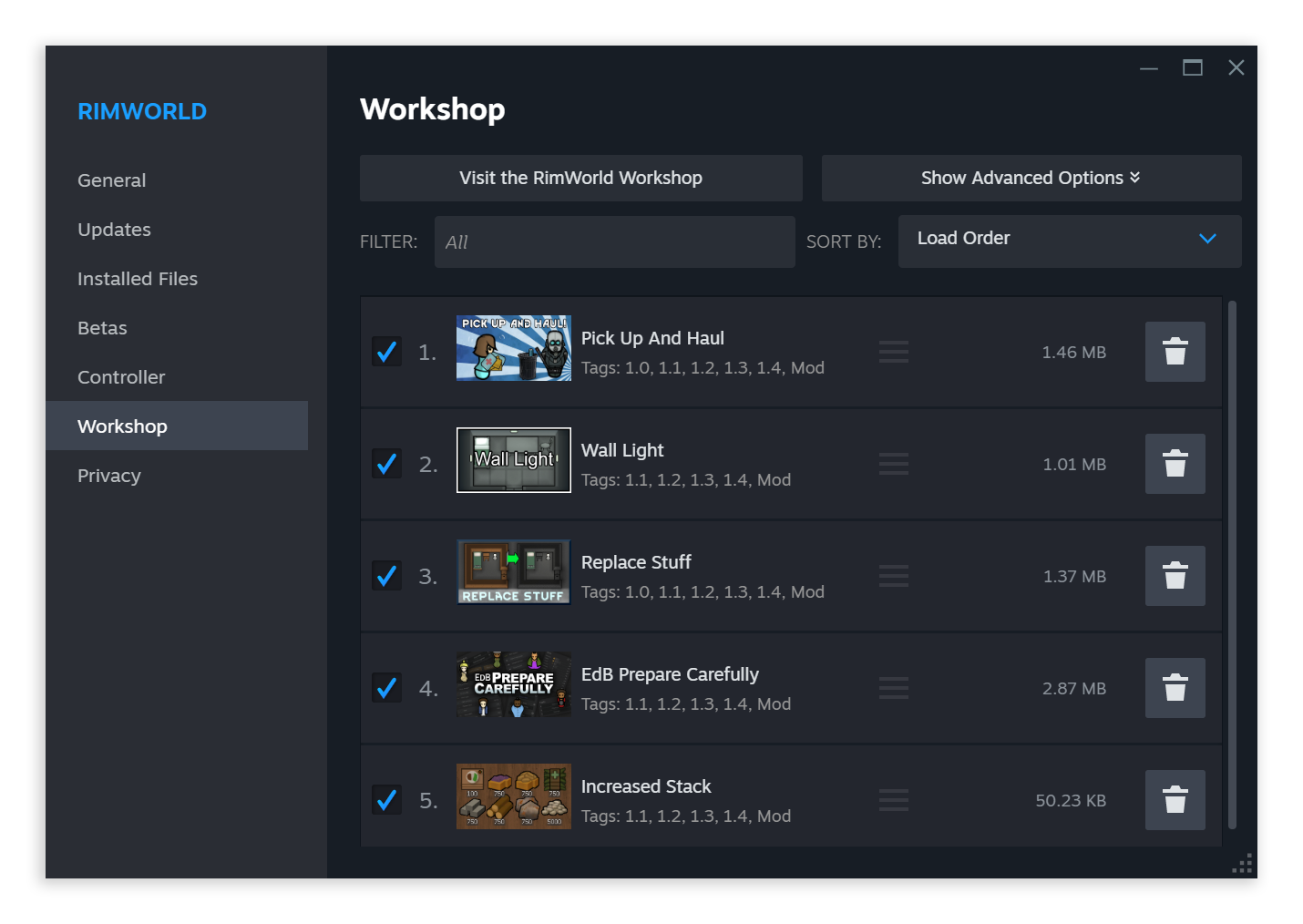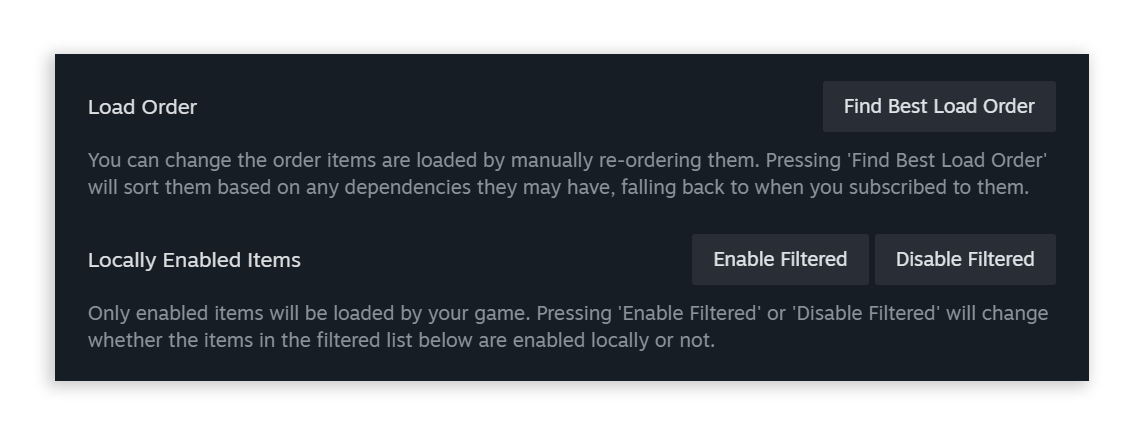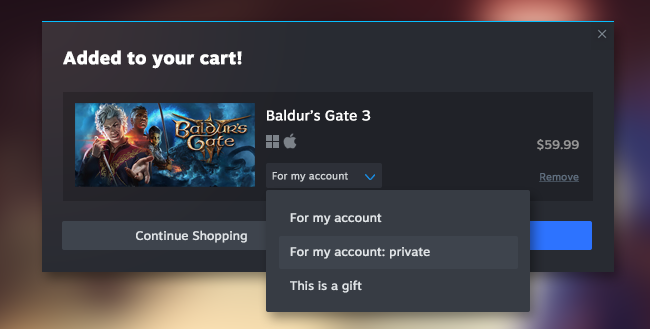911 Jumper
Learned
- Joined
- Jun 12, 2023
- Messages
- 1,574
New vid from Richard at DF (11 minutes)




lol, mine is gone again. I got it back yesterday after activating "big screen mode".Newsfeed seems to be back on librabry.

The guy in the Valve splash screen
I was wondering who that bald guy with the valve in his head was in the Valve splash screen and emailed Gabe. Learned some interesting things when I got this response from Ray Ueno:
I worked with Gabe and team to develop the "guy in the logo" back when we first named the company, Valve (circa 1995/6), and needed to develop the visual brand vocabulary to go along with it.Interesting that you should ask about the bald guy. Back then, the casting agencies we were using to find models only had "supermodel"-type talent. We kept requesting "heavy-set", "normal" models, and they kept sending us "beautiful", "thin", "perfect" headshots to review.So, we finally asked them to just go out on the street and pull "everyday Joes" who were more "interesting", "common", and for the bald guy, "kinda big, heavy-set, and bald".They went out to the streets of Seattle's Broadway district, took tons of polaroids of the types of folks we were looking for, and brought the shots back to us. We selected the bald guy from the batches of "off-the-street" polaroids—he was literally pulled out of a coffee shop or book store!A few days later, we brought him into studio and shot the image you now see at the beginning of our games. We also shot a 2nd image of a different guy with a valve in his eye using the same process (you might remember him as well—attached below). The two comprised the "Open your mind. Open your eyes." concept for our initial brand, respectively.It's been very long since we did that work, so we don't know who the models were. And the fact that they weren't professional models, would make it very difficult to find them—if not impossible for the bald guy (not facing camera).Hope that answers your question. If you have any others regarding the Valve brand, please feel free to contact me anytime.edit: After thanking Ray for the response and linking him here, he followed up with this:Thanks for your interest in Valve and the bald guy image.
I read a few the comments that your post has already gotten, and one of them asked about the origins of the Valve name and "why is the 'e' superscript?"Pretty good timing. One of the items on my to-do list is to write up that story—we get asked for the backstory from time to time. So once I complete it, I'd be happy to send it to you.



















New Quality of Life Workshop Features
We've recently added some features to the Workshop that should be pretty useful for both new and power users alike.
The new Steam Client beta has various improvements around Workshop, including displaying which item is being downloaded in the Downloads page, and an improved interface for dealing with your Workshop item subscriptions (accessible from your game's Properties dialog). The subscription list now contains additional information, such as when the item was last updated, when you subscribed to it, and any item dependencies. You can also filter your list by name or by tag.

For more advanced use cases, you can disable items from being loaded by your game. And you can now change the local load order for your items. Also, if Workshop creators have set their items as depending on other items, you can automatically set the load order based on these dependencies. Missing dependencies will also be displayed, to make it easier to see why some mods are not working. You can opt into the Steam Client beta to try out these changes.

On the web side of things, we've added Saved Search Queries. Basically, if you often find yourself searching/sorting/filtering to find the same kind of items in a game's Workshop, you can now save those search query parameters. Then you can re-run your search at any time by selecting that saved search query from your game's Workshop home page.
We've also added some more browsing options to the main Workshop Home page. You can now filter to games that have Workshops based on whether you recently visited them, and we've brought back the ability to view Workshops for games you own or have recent playtime in.
Plus a few other web changes:
- Added the ability to subscribe to an item and all the items it depends on
- Added previous and next buttons to the image viewer
- Adding an item to a collection no longer reloads the web page
- Allow unlisted and friends-only items to be added to a collection
Let us know your thoughts in the Steam Client Beta discussions.
The box then randomly appears on your screen in places you want to click, trying to trick you into pulling the trigger on your own account.I'm going to be that guy, but it's not the opening of the gift that bans you. Would be piss easy to circumvent once this spreads otherwise.
I'm going to be that guy, but it's not the opening of the gift that bans you. Would be piss easy to circumvent once this spreads otherwise.

![Glory to Codexia! [2012] Codex 2012](/forums/smiles/campaign_tags/campaign_slushfund2012.png)
![Have Many Potato [2013] Codex 2013](/forums/smiles/campaign_tags/campaign_potato2013.png)
![The Year of Incline [2014] Codex 2014](/forums/smiles/campaign_tags/campaign_incline2014.png)













I've never used Big Picture. Why is this feature so popular? I have no problem switching to my other display. I have a profile for it in Monitor Profile Switcher and simply press a shortcut.

"Counter-Strike"-Lootboxen erstmalig für illegal erklärt: Valve Corporation verliert spektakulären Gerichtsprozess
Prozessfinanzierer Padronus und Rechtsanwaltskanzlei Salburg gewinnen nun auch gegen die Valve Corporation und versetzen der Videospielbranche einen weiteren herben Rückschlag.
Wien (OTS) - Ein Gericht in der Steiermark hat die Valve Corporation als Betreiber des beliebten Videospiels „Counter-Strike" zur Rückerstattung von €14.096,58 verurteilt, die ein Kunde von Padronus für Lootboxen aufgewendet hatte. Padronus und die Kanzlei Salburg argumentierten im gerichtlichen Musterverfahren, dass die in "Counter-Strike" angebotenen Lootboxen gegen das österreichische Glücksspielgesetz verstoßen würden und die ausgegebenen Beträge daher zurückzuerstatten seien. Das Gericht folgte dieser Ansicht und klassifizierte die Counter-Strike-Lootboxen als illegales Glücksspiel. Das Urteil ist noch nicht rechtskräftig.
Der Gerichtsprozess wurde im Rahmen des von Padronus finanzierten Sammelverfahrens geführt. "Es handelt sich um das erste Lootbox-Urteil im gesamten deutschsprachigen Raum betreffend Counter-Strike. Die Valve Corporation ist nach den Spielebetreibern von FIFA somit nun der zweite Videospielanbieter, der nachgewiesenermaßen illegales Glücksspiel in Österreich anbietet", kommentiert der Geschäftsführer von Padronus, Richard Eibl, das Urteil. "Laut diversen Studien generiert Valve circa eine Milliarde Umsatz durch Counter-Strike-Lootboxen. Der österreichische Marktanteil davon ist nicht unbeträchtlich, da Österreicher im internationalen Vergleich sehr glücksspielaffin sind. Aufgrund des Urteils sind daher dutzende Millionen Euro an jährlichem Umsatz für Valve gefährdet", so Eibl.
Padronus war zusammen mit der Kanzlei Salburg bereits im Frühjahr vor dem Bezirksgericht Hermagor sowie in zweiter Instanz vor dem Landesgericht für Zivilrechtssachen Wien gegen Sony und Electronic Arts erfolgreich gewesen, als dort erstmalig Lootboxen im Videospiel "FIFA" für illegal erklärt wurden. Die beiden Urteile sind mittlerweile rechtskräftig. "Der rechtliche Kampf um Lootboxen ist vorbei und gewonnen. Das Urteil ist das Ende für Lootboxen in Österreich", ist sich Eibl sicher. "Selbst wenn die Valve Corporation Berufung einlegt, wovon wir nicht ausgehen, stehen ihre Chancen extrem schlecht, denn wir haben bereits in zweiter Instanz in der selben Rechtsfrage gegen Electronic Arts und Sony gewonnen", so Eibl.
Für das Spiel Counter-Strike werden Schusswaffen und Messer verwendet, die realen Waffen und Messern nachempfunden sind; diese können mit "Skins“ versehen werden, die die optische Aufmachung verändern. Solche Skins können durch das Öffnen von als "Weapon Cases“ bezeichneten Lootboxen erworben werden. Die Skins sind in verschiedene Seltenheitsgrade eingeteilt und sind prinzipiell am Steam-Community-Market handelbar, wobei verschiedene Skins unterschiedliche Preise am Markt erzielen. Besonders seltene und begehrte Skins werden teilweise für fünfstellige Euro-Beträge gehandelt, häufige und weniger begehrte Skins hingegen teils für niedrige Cent-Beträge.
Laut dem Gericht sei das inhaltliche Ergebnis der "Weapon Cases" vom Zufall abhängig und stelle eine vermögenswerte Leistung im Sinne des österreichischen Glücksspielgesetzes dar, weil die "Skins" auf einem Zweitmarkt (z.B. "Steam") gehandelt würden und dadurch eine Gewinnerzielung möglich sei. Daher handle es sich um Glücksspiel. Da Valve keine Glücksspiel-Konzession besitze, seien die zwischen ihr und dem Kläger abgeschlossenen Verträge nichtig und die geleisteten Zahlungen rückforderbar. "Wir hatten das große Glück, dass der Richter in diesem Verfahren sich mit Counter-Strike aus persönlicher Erfahrung auskannte und den Sachverhalt sofort durchdrungen hat. In unseren Parallelverfahren ist es oft die größte Herausforderung, die Logik der Videospiele mitsamt ihren zahlreichen Anglizismen Richtern verständlich zumachen, die selbst noch nie ein Videospiel gesehen, geschweige denn gespielt haben", erzählt Eibl.
Jurist Michael Linhard von der Kanzlei Salburg kommentiert das Urteil wie folgt: "Die aktuellen Gerichtsentscheidungen zu Lootboxen zeigen, dass das österreichische Glückspielgesetz Lootboxen immer schon umfasst hat. Eine eigene Adaptierung für Lootboxen, wie derzeit von manchen Parteien im Nationalrat gefordert, scheint daher nicht notwendig zu sein. Nachdem Spielehersteller jahrelang dieses bedenkliche Monetarisierungssystem an die Spitze treiben konnten und die Politik lange Zeit nur untätig zugeschaut hat, schiebt jetzt die österreichische Justiz diesen Praktiken einen Riegel vor. Wieder einmal zeigen die österreichischen Gerichte eindrucksvoll, dass sie die geltenden Gesetzte exakt auf moderne Entwicklungen anwenden können."
Auch Rechtsanwältin Katharina Kraemer, ebenfalls von der Kanzlei Salburg, zeigt sich erleichtert: "Die jüngste Entscheidung, dass es sich bei Lootboxen um Glücksspiel handelt, markiert einen bedeutenden Schritt in Richtung Verbraucherschutz und Transparenz im Bereich der Videospiele. Das Urteil reflektiert mögliche Bedenken hinsichtlich Glücksspielelementen und hebt die Notwendigkeit hervor, Spieler, insbesondere Minderjährige, vor potenziellen Risiken zu schützen."
Prozessfinanzierung im Glücksspielbereich ist das Spezialgebiet von Padronus. Das Unternehmen hat tausende Gerichtsverfahren gegen diverse Online-Casino-Anbieter in Österreich und Deutschland finanziert und bereits mehrere zehn Millionen Euro für Spielsüchtige zurückgeholt. "Wir haben mehrere tausend Anfragen von Lootbox-Käufern für unser Sammelverfahren erhalten; die Nachfrage ist groß. Die meisten Kunden berichten uns, dass sie pathologisch spielsüchtig sind und ihr Leben aufgrund der Lootboxen außer Kontrolle geraten ist. Das Urteil ist Wind auf unseren Segeln und spornt uns dazu an, unser Sammelverfahren weiter auszubauen. Wir laden jeden Lootbox-Käufer dazu ein, sich zu unserem Sammelverfahren anzumelden", so Eibl.
I had issues with Starship troopers. The anti cheat would launch but the game never would. I never got to play the game but for some reason Steam said I had it open for 10 fucking hours because I was trying various fixes to get it to work. Couldn't refund a game I couldn't play ffs.Damn, and I have issues refunding a game that went past the 2-hour limit at times.
Shopping Cart updates and Private Games
Starting today, users who have opted into the Steam Client Beta will see a new version of the shopping cart when checking out on the Steam Store. These users will also be able to mark games in their library as private.
Shopping Cart Updates
The Steam Store's updated shopping cart includes some handy new features:
- Inline gifting
- just in time for the holidays, you can now purchase gifts for multiple friends (and yourself) without having to make multiple purchases. Plus gift messaging has been simplified to speed up the checkout process.- One cart across all devices
- items in your shopping cart will now follow you across all devices where you're signed in to Steam. Note that during the beta, the cart will only be accessible within the beta client.- Private purchasing
- keeping your games private starts before you even make a purchase, so the new cart lets you mark a game as private before you check out.

Private Games
Steam has long supported multiple levels of privacy for your Steam profile and your entire games list. However, there are times when you might want to keep a few of the games you own off those lists.
Starting today you’ll be able to mark specific games as private and they’ll disappear from anywhere they’d be viewed by someone other than you. That includes: your ownership, in-game status, playtime, and activity in that game. This additional control allows you to keep most of your Steam Library visible to your friends, so they can see what you are playing and join in, yet also keep a few of those games just to yourself.
How do I mark a game as private?
There are three places where a game can be marked as private: from your shopping cart, your game list (which is accessible from a web browser), and from your Steam Client Library (Game page > Settings > Manage...)
You can learn more about private games on the FAQ
We've got more checkout related updates in the works, so make sure to send us your feedback and report bugs.















AI Content on Steam
Back in June, we shared that while our goal continues to be shipping as many games as possible on Steam, we needed some time to learn about the fast-moving and legally murky space of AI technology, especially given Steam's worldwide reach.
Today, after spending the last few months learning more about this space and talking with game developers, we are making changes to how we handle games that use AI technology. This will enable us to release the vast majority of games that use it.
First, we are updating the Content Survey that developers fill out when submitting to Steam. The survey now includes a new AI disclosure section, where you'll need to describe how you are using AI in the development and execution of your game. It separates AI usage in games into two broad categories:
- Pre-Generated: Any kind of content (art/code/sound/etc) created with the help of AI tools during development. Under the Steam Distribution Agreement, you promise Valve that your game will not include illegal or infringing content, and that your game will be consistent with your marketing materials. In our pre-release review, we will evaluate the output of AI generated content in your game the same way we evaluate all non-AI content - including a check that your game meets those promises.
- Live-Generated: Any kind of content created with the help of AI tools while the game is running. In addition to following the same rules as Pre-Generated AI content, this comes with an additional requirement: in the Content Survey, you'll need to tell us what kind of guardrails you're putting on your AI to ensure it's not generating illegal content.
Valve will use this disclosure in our review of your game prior to release. We will also include much of your disclosure on the Steam store page for your game, so customers can also understand how the game uses AI.
Second, we're releasing a new system on Steam that allows players to report illegal content inside games that contain Live-Generated AI content. Using the in-game overlay, players can easily submit a report when they encounter content that they believe should have been caught by appropriate guardrails on AI generation.
Today's changes are the result of us improving our understanding of the landscape and risks in this space, as well as talking to game developers using AI, and those building AI tools. This will allow us to be much more open to releasing games using AI technology on Steam. The only exception to this will be Adult Only Sexual Content that is created with Live-Generated AI - we are unable to release that type of content right now.
It's taken us some time to figure this out, and we're sorry that has made it harder for some developers to make decisions around their games. But we don't feel like we serve our players or developer partners by rushing into decisions that have this much complexity. We'll continue to learn from the games being submitted to Steam, and the legal progress around AI, and will revisit this decision when necessary.







